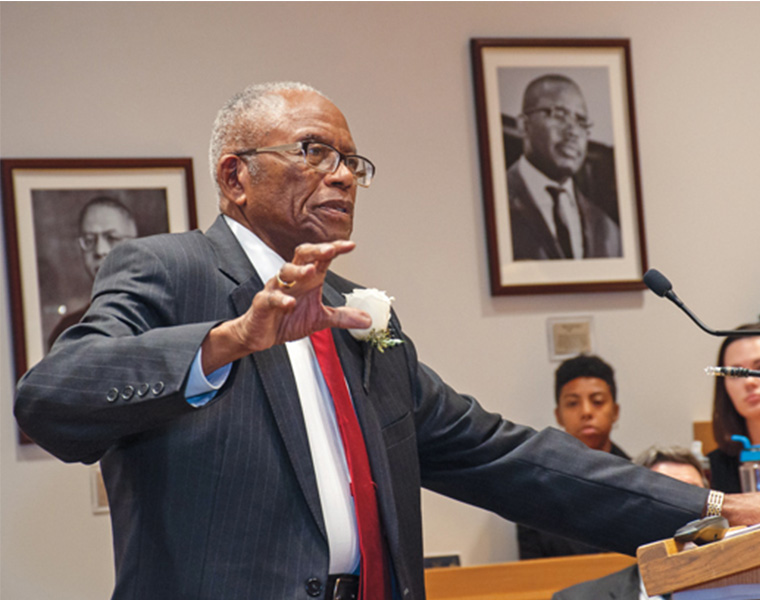When Alabama native Rosa Parks refused to give up her bus seat to a white passenger in 1955, she became a household name as a leader of the Civil Rights Movement. Her decision—which Ohioans celebrate as Rosa Parks Day on Dec. 1, the day of her arrest—also cemented another name in the history books: that of Fred Gray (LAW ’54), a 24-year-old attorney and one of few African American lawyers in his home state at the time.
Gray counseled Parks about what she might do if asked to give up her seat to a white passenger and, when the event took place, represented her in court. The choice ultimately resulted in the Supreme Court upholding lower court decisions prohibiting segregation on city buses, the first of many successes in a career that led Gray to earn the Presidential Medal of Freedom in 2022.

Encouraged by a teacher to apply to law school despite earlier plans to become an historian and preacher, Gray moved to Cleveland and received a Juris Doctor degree from Case Western Reserve University School of Law in 1954. At the time, there was no law school in Alabama that would accept African Americans.
His cases representing Rosa Parks and Claudette Colvin, another young Black woman charged with disorderly conduct for refusing to sit in the back of a city bus, were among the first in Gray’s practice. He became the chief legal strategist during the Montgomery bus boycott, launching a nearly seven-decade career as a civil rights lawyer. In that time, he successfully litigated four civil rights cases before the U.S. Supreme Court and played a crucial role in many of the biggest moments in civil rights history.
Among his many credits, Gray represented marchers during the Selma-to-Montgomery civil rights marches of 1965. He later represented the victims of the infamous Tuskegee syphilis study, obtaining a settlement for the survivors in 1975 and an apology from President Bill Clinton, on the government’s behalf, in 1997.
Among his many honors, Gray has received the Thurgood Marshall Award from the American Bar Association, the Sarah T. Hughes Civil Rights Award from the Federal Bar Association, the Charles Hamilton Houston Medallion from Harvard Law School, the Centennial Medal from Case Western Reserve University School of Law, a 2016 Distinguished Alumni Award from the Case Western Reserve Alumni Association and numerous honorary degrees. As noted, President Joe Biden presented Gray with the Presidential Medal of Freedom on July 7, 2022. And just this year, the American Bar Association awarded him the 2023 ABA Medal, the association’s highest honor. A scholarship in his name exists for underrepresented students at Case Western Reserve’s School of Law.
Gray was portrayed by Academy Award-winning actor Cuba Gooding Jr. in the 2014 film Selma.
“Fred Gray’s impact on the civil rights movement is legendary,” said Co-Dean Michael Scharf. “His indefatigable and tenacious pursuit of equal justice over seven decades has inspired generations of law students and lawyers across the country.”
Fred Gray is still a practicing attorney in Alabama at age 92.

